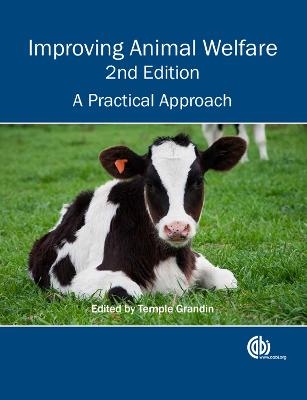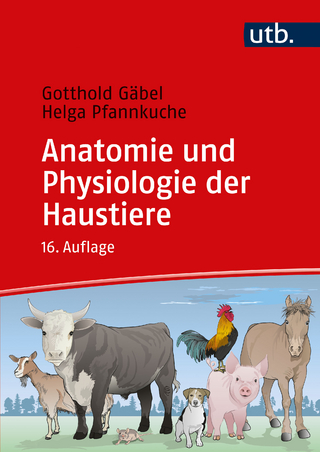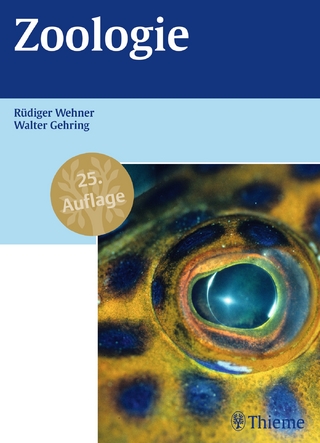
Improving Animal Welfare
CABI Publishing (Verlag)
978-1-78064-467-7 (ISBN)
- Titel ist leider vergriffen;
keine Neuauflage - Artikel merken
By taking an entirely practical approach, this textbook aims to help those working with animals to apply methods for improving welfare, bridging the gap between scientific research and practical application. This book provides a guide to practical evaluation and auditing of welfare problems for farmed animals, emphasizing the importance of measuring conditions that compromise welfare such as lameness, or the use of electric goads. This second edition is fully updated with new literature, new, up to date coverage of pain management, and the addition of a new chapter on animal welfare in organic farming systems.
Temple Grandin is Professor of Animal Science at Colorado State University. Dr. Grandin's work includes design of animal handling systems, research on livestock behaviour, and auditing animal welfare. She has visited 26 countries and has served on the OIE animal welfare ad hoc committee for slaughter. Her previous livestock books include Livestock Handling and Transport, Genetics and the Behavior of Domestic Animals and Humane Livestock Handling. Her popular press books on animal behaviour have been both U.S. and international bestsellers. Throughout her career, Dr. Grandin has worked to combine scientific research results with practical application in the field. In the North America half, the cattle are handled in equipment she designed for meat plants. She has received awards for her work on animal welfare from both the livestock industry and animal welfare NGOs. She has awards from The Royal Society for the Prevention of Cruelty to Animals, The American Meat Institute, American Society for Animal Science and the Humane Society of the U.S. International Society for Equitation Science, President Scientific Research Committee member since 2007 Co-chair ISES 2015/2013/2007 conferences International Society for Applied Ethology Equine Science Society (formerly Equine Nutrition & Physiology Society) National Association of Equine Affiliated Academics MSU Center for Gender in Global Context -Affiliated Faculty Member MSU Center for Latin American and Caribbean Studies - Consulting Faculty MSU ANS/CVM International Programs Steering Committee Education B.S., The University of Georgia, Athens, GA (Animal Science (Equine Emphasis); Dairy Science; Minor: Agribusiness M.S., The University of Georgia, Athens, GA (Dairy Science- Reproduction Physiology (Emphasis)) Ph.D., Michigan State University, East Lansing, MI (Donkeys (Equus asinus) Nutrition, Training, and Management) Research Interests Improving equine management, behavior and welfare with a specific interest in donkeys, mules, hinnies and working equids in developing countries. Current Research Projects Mule Behavior with two main focuses: Pain Assessment- focus on facial grimace scale Behavior development- early foal handling Hematology and blood biochemistry reference values in clinically healthy mules and hinnies Comparing morphometric measurements in donkeys, mules, and hinnies Integrated approaches to improving dairy donkey welfare and donkeys being used in production by using physiological and morphometric measurements (in collaboration with the University of Torino's Veterinary Science Program, Torino, Italy) Comparing welfare indicators in working equids in developing countries Comparing heart rate variability and behavioral indicators when using restraint mechanisms in Mules Participatory approaches to working with and surveying mule and donkey owners in developing countries Graduate Groups
1: An Introduction to Implementing an Effective Animal Welfare Program 2: The Importance of Measurement to Improve the Welfare of Livestock, Poultry, and Fish 3: Why is Agricultural Animal Welfare Important? The Social and Ethical Context 4: Implementing Effective Standards and Scoring Systems for Assessing Animal Welfare on Farms and Slaughter Plants 5: How to Improve Livestock Handling and Reduce Stress 6: Painful Husbandry Procedures in Livestock and Poultry 7: The Importance of Good Stockmanship and Its Benefits to Animals 8: Animal Well-being and Behavioural Needs on the Farm 9: Improving Livestock, Poultry, and Fish Welfare in Slaughter Plants with Auditing Programs 10: Recommended On-farm Euthanasia Practices 11: Welfare During Transport of Livestock and Poultry 12: Why Are Behavioral Needs Important? 13: Animal Well-being on Organic Farms 14: The Effect of Economic Factors on the Welfare of Livestock and Poultry 15: Improving Animal Care and Welfare: Practical Approaches for Achieving Change 16: Successful Technology Transfer of Behavioral and Animal Welfare Research to the Farm and Slaughter Plant 17: Practical Methods for Improving the Welfare of Horses, Donkeys, Mules, and Other Working Draft Animals in Developing Areas
| Erscheint lt. Verlag | 21.7.2015 |
|---|---|
| Co-Autor | Anne de Passillé, Lily Nowell Edwards, Dr Camie Heleski, Jeff Hill |
| Verlagsort | Wallingford |
| Sprache | englisch |
| Maße | 189 x 246 mm |
| Gewicht | 1258 g |
| Themenwelt | Naturwissenschaften ► Biologie ► Zoologie |
| Veterinärmedizin ► Großtier | |
| Weitere Fachgebiete ► Land- / Forstwirtschaft / Fischerei | |
| ISBN-10 | 1-78064-467-1 / 1780644671 |
| ISBN-13 | 978-1-78064-467-7 / 9781780644677 |
| Zustand | Neuware |
| Haben Sie eine Frage zum Produkt? |
aus dem Bereich


